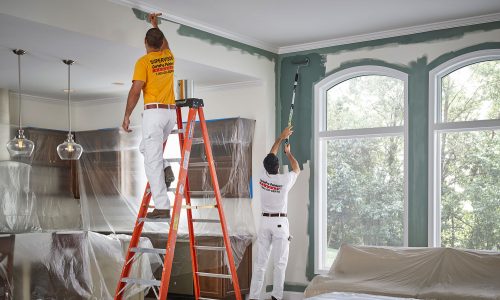Painting is among the fastest ways to improve and boost worth of your house. Fresh paint can brighten rooms and gives the exterior appear fresher. While painting is a typical DIY task for homeowners, it could take more effort than you’re willing to undertake. If you aren’t able to find the time and skills required to do the painting yourself then you might want to consider hiring a professional. Professional artists have the resources to complete projects in a timely manner, and within budget.
What Does a Painting Contractor Do?
Painting contractors go beyond apply paint to walls. The advantage of working with an expert is that they will finish the job quickly and can prepare and clean up after it’s completed. Here are a few things you can anticipate when working with a contractor
Moving furniture to gain access to the areas that need to be painted. The homeowner is usually accountable for the removal of small items.
All areas that are not painted.
The surface preparation prior to painting may include filling in holes, smoothing off the surfaces, taking off of any covers that may be needed, scraping and sanding away any paint that is loose.
The process of priming on the exterior (not always included in the base price).
Applying two coats of paint on the ceiling and walls.
The trim and molding are painted.
Retouching missed spots.
Cleaning up and removal of tarps/drop cloths
Final inspection conducted with foreman as well as homeowner.
1. Begin with a plan
You can reduce time and costs by having a the proper plan. A few things to think about when creating your plan include:
It is an exterior or interior job?
Some painting companies have different teams for both exterior and interior projects. Exterior painting is contingent of the climate. If the day on which you are scheduled to paint rains out, you’ll require flexibility in your scheduling.
What time of the year would you like to see the painting to be completed?
Depending on the area you live in the exterior painting process is usually only available in the summer and spring. In addition, weather conditions can slow down your painting.
What number of rooms do you wish to paint?
It’s likely to be able to get a better price for painting your interior if you have several rooms painted. The idea of sending out a team for a single room isn’t economical as you’ll be paying more for a tiny task.
What impact will it have on your schedule for work/home?
Most reliable companies will have the owner or a parent to be present when the contractors are working on their premises.
2. Research Painting Contractors
When you’ve got your strategy set, it’s time to begin researching contractors. A painting contractor must have at least an insurance certificate and a current license coverage. It is possible to start by researching businesses online and then reviewing reviews. The ideal company for your job must have years of experience working on painting projects, as well as a lengthy list of satisfied clients.
3. Get Referrals
The majority of painting contractors are small local businesses. The services offered by them can differ and some offer only painting, while others provide additional services, such as repair of plaster, trim, wallpapering and molding. Personal recommendations are the best source of information for locating an experienced painting contractor. Visit local community boards or seek out whether your friends, neighbors or family members have hired
painting contractors in recent times.
4. Interview Painting Contractors
Alongside online research and referrals, it’s advisable to conduct your initial interviews over the phone.
Here are some questions to ask
Do you have ideas from similar projects that you’ve worked on recently?
Who is working on the project? Are they subcontractors or employees?
Are you insured and licensed? Please supply your contractor license number and proof of insurance.
What kind of color do you choose to use?
Is the cost of painting included within the estimation?
What number of coats are there in the package?
Do you prefer residents to not be in the home during your work?
What are your expectations regarding payment?
5. Vet Your Top Prospects
After you’ve narrowed your options, you’re able to contact references for brief interviews. This will allow you to identify the companies you want that you could contact to get estimates. The most important questions to ask for references include:
Did the project get completed in time?
Are you pleased with the work they did?
Did your project run over budget?
Was the contractor, and any subcontractors courteous and professional?
Would you ever hire them in the future?
6. Get Estimates in Writing
Contact three painting companies for estimates. The company will dispatch an agent to your residence. They will tour your home and discuss which rooms or areas need painting. The company will then send you an estimate written in written form. The estimate should contain:
Contact details: Company name address, phone number, and web address.
Total cost, including taxes.
The scope of the project It should include the areas that will be painted, the details of the preparation work to be performed as well as the process of applying.
Specifications of paint: What type of paint and other products are utilized.
Dates for completion and start dates.
Terms and conditions for payment: Terms must be simple and simple to comprehend.
While the total cost of the project is an important consideration but it shouldn’t be the primary factor in hiring an expert painting contractor. Take into account the experience of the company as well as their track record in finishing projects on time and within budget and reviews from previous customers. https://aucklandpremiumpainters.co.nz/

